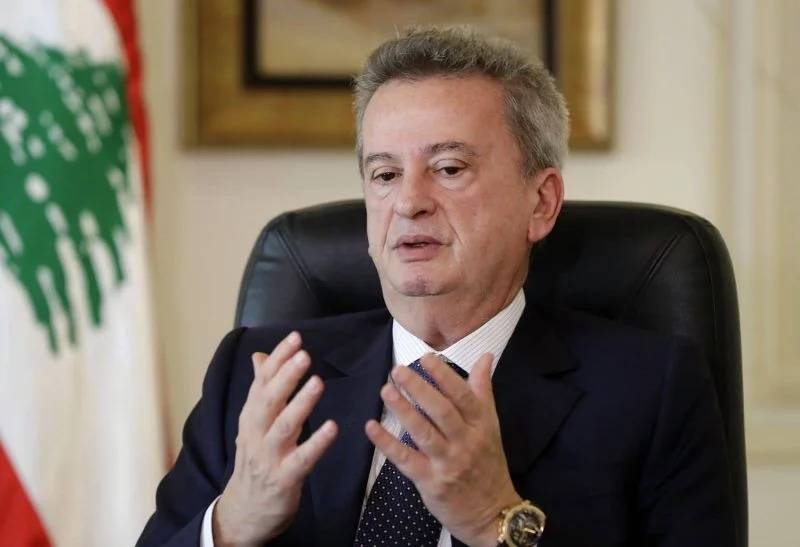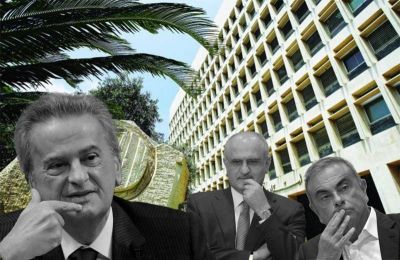
BDL Governor Riad Salameh. (Credit: AFP)
The international arrest warrants for Riad Salameh have set an historic precedent: for the first time, an active central bank governor is the subject of an Interpol red notice, following his refusal to appear before French magistrates. Worse still, he remains in his post, defying calls (late in the day as they are in coming) for his resignation, without being questioned by his country's justice system, or even dismissed by the political authorities.
The charges against him are heavy: money laundering, illicit enrichment, tax evasion, forgery and use of forgeries.
Yet, faced with the gravity of these charges, the Lebanese judicial authorities never miss an opportunity to add ridicule to dishonor: from the farce staged by Judge Charbel Abou Samra trying in vain to issue the summons to the governor, to the grotesque decision taken this week by Judge Imad Kabalan to ban him from leaving the country, de facto preventing him from appearing before foreign courts.
This lethargy on the part of the judiciary is no longer tolerable. It is imperative, in our view, that the authorities finally assume their responsibilities, and stop twisting the law to obstruct the Lebanese people’s legitimate aspirations to justice: whether it be the interventions of the public prosecutor’s office and the multiple “requests for recusal” that are hampering the investigation into the Aug. 4, 2020 Beirut port tragedy, or the delaying tactics aimed at preventing Salameh from answering for his actions. The events of the last few days are yet another reminder of the absolute necessity of our flagship battle for the independence of the judiciary.
These judicial twists and turns clearly show that Riad Salameh remains more than ever the protégé of the political class. The silence and complacency of ministers from all sides following their meeting on Monday, May 22 is a flagrant example of this. In fact, it is remarkable to note that, since his arrival at the head of the Banque du Liban in 1993, governments and parties have come and gone, while he has remained in place. Today, he is the protégé of the Nabih Berri-Najib Mikati tandem, all under the umbrella of Hezbollah, which has every interest in seeing Lebanon’s transformation into a vast underground economy of opacity, and trafficking of all kinds continue.
An underground economy that had its roots, long before the crisis of 2019, in the economic mirage of which “the magician” Salameh has been, over the last 30 years, the architect, the fireman and ultimately, the pyromaniac. It was he who, at the end of the war, put in place the cogs of the infernal mechanism at the origin of the collapse. A mechanism which, on the pretext of ensuring a monetary parity artificially inflating the standard of living of the Lebanese, consisted in sucking in whatever it cost — Ponzi scheme included — the capital necessary to finance, on the one hand, the imports of a country that produces nothing, and, on the other hand, a public debt serving the clientelism of the traditional parties.
But if the replacement of the current governor is of the utmost urgency, it is not so much because of his heavy record, but rather because of the risks that his continuation continues to pose to what remains of our monetary and financial system, given that the instability on the money market and the loss of confidence that are likely to ensue are likely to deal the final blow to a devastated economy. Especially as Mr. Salameh’s agenda for his final weeks in office seems clear: to pursue his suicidal policy of “buying time,” multiplying interventions to maintain the illusion of “stabilizing” the exchange rate, even if it means burning our last cartridges and leaving his successor totally unarmed, even if it means cutting the country off from the global financial system.
Riad Salameh must therefore be dismissed as quickly as possible. It is up to the executive power to replace him, in accordance with current constitutional rules. The expectations for his succession are clear: firstly, his profile: a man of integrity, competence and, above all, free from any conflict of interest with the banks or the Lebanese political system. Secondly, his mandate: to work towards transparency by implementing a forensic audit and completely cleaning up the BDL’s accounts, and to re-establish a culture of accountability within the institution, by applying the separation of powers within its various supervisory and regulatory bodies. Another monetary policy priority is to liberalize and unify the exchange rate, in coordination with the government and the IMF; and to implement bank restructuring, in line with international principles while protecting depositors’ rights. He will also have to support the macroeconomic reforms requested by the IMF, and finally, bring the BDL back to its proper role by ceasing all forms of activity outside its field of action.
Of course, Riad Salameh is not solely responsible for the country’s financial, social and political bankruptcy. Of course, the traditional parties, and Hezbollah in particular, are the main obstacles to state-building. But bringing Riad Salameh to justice may just be the first blow to this system of corruption and impunity.
Signatories:
Mark Daou, MP for Aley (Taqaddom movement)
Michel Doueihy, MP for Zgharta
Ramy Finge, former parliamentary candidate for Tripoli (Intafid Movement)
Michel Helou, secretary-general of the Bloc National
Waddah Sadek, MP for Beirut (Khat Ahmar)
Michel Helou is L’Orient-Le Jour’s former director general and continues to hold a seat on the newspaper’s board.

